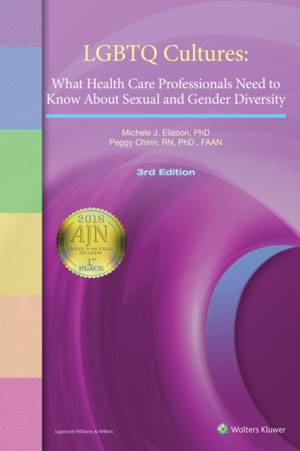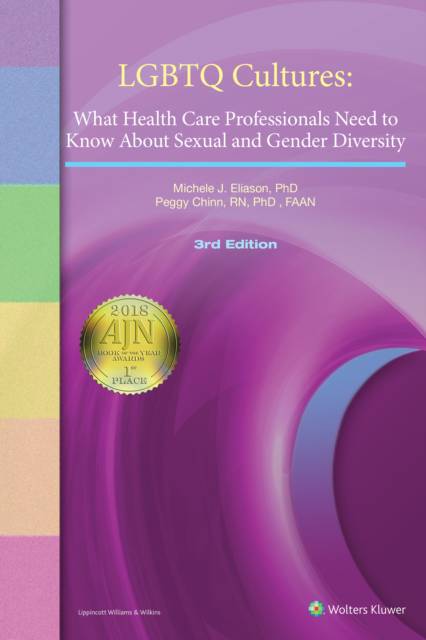
- Afhalen na 1 uur in een winkel met voorraad
- Gratis thuislevering in België vanaf € 30
- Ruim aanbod met 7 miljoen producten
- Afhalen na 1 uur in een winkel met voorraad
- Gratis thuislevering in België vanaf € 30
- Ruim aanbod met 7 miljoen producten
Zoeken
LGBTQ Cultures
What Health Care Professionals Need to Know about Sexual and Gender Diversity
Eliason Michele J, Peggy L Chinn
Paperback | Engels
€ 76,95
+ 153 punten
Omschrijving
Selected as a Doody's Core Title for 2022! Winner of the 2018 AJN Book of the Year Award in the Community/Public Health category. Drawn from real-world experience and current research, the fully updated GBTQ Cultures, 3rd Edition paves the way for healthcare professionals to provide well-informed, culturally sensitive healthcare to lesbian, gay, bisexual, transgender, and queer (LGBTQ) patients. This vital guide fills the LGBTQ awareness gaps, including replacing myths and stereotypes with facts, and measuring the effects of social stigma on health. Vital for all nursing specialties, this is the seminal guide to actively providing appropriate, culturally sensitive care to persons of all sexual orientations and gender identities. Care for LGBTQ patients with awareness, sensitivity, and knowledge . . .
Michele J. Eliason, PhD, is Assistant Dean of the College of Health and Social Sciences at San Francisco State University in San Francisco, California.
Peggy L. Chinn, RN, PhD, FAAN, is Professor Emerita of Nursing at the University of Connecticut and the Editor of Advances in Nursing Science.
- NEW and updated content includes references to case studies, discussion aids, links to videos, and action steps
- Explains basic concepts and terminology related to sexual orientation and gender identity--what constitutes culturally appropriate care and its importance for nurses
- Offers up-to-date statistics on healthcare refusal rates, prominent LGBTQ health issues, and social, psychological, and environmental factors affecting LGBTQ health and healthcare
- Specific information on LGBTQ populations that helps nurses improve quality of care, care decisions, and referrals
- Essential classroom and clinical guide-- illuminates LGBTQ healthcare needs for all professional healthcare schools and all practice settings--hospitals, clinics, residential programs, private practices, public health policy settings, and more
- Ideal best practices guide for all nurse clinicians, nurse educators, community health workers, and policy-makers
- Delineates the needs of different LGBTQ communities, cultures, and populations Topics include:
- Diversity issues
- Developmental issues
- LGBTQ families
- Structural changes that need to occur in healthcare systems to create culturally sensitive services
- Substance abuse issues
- Mental health issues
- Risk behaviors, chronic disorders, and serious illnesses
- Studies and resources for improving inclusion in practice and curricula
- Structural barriers to quality care--making healthcare settings inclusive
- Individual, institutional, community, and societal calls to action
Michele J. Eliason, PhD, is Assistant Dean of the College of Health and Social Sciences at San Francisco State University in San Francisco, California.
Peggy L. Chinn, RN, PhD, FAAN, is Professor Emerita of Nursing at the University of Connecticut and the Editor of Advances in Nursing Science.
Specificaties
Betrokkenen
- Auteur(s):
- Uitgeverij:
Inhoud
- Aantal bladzijden:
- 272
- Taal:
- Engels
Eigenschappen
- Productcode (EAN):
- 9781496394606
- Verschijningsdatum:
- 16/11/2017
- Uitvoering:
- Paperback
- Formaat:
- Trade paperback (VS)
- Afmetingen:
- 152 mm x 229 mm
- Gewicht:
- 408 g

Alleen bij Standaard Boekhandel
+ 153 punten op je klantenkaart van Standaard Boekhandel
Beoordelingen
We publiceren alleen reviews die voldoen aan de voorwaarden voor reviews. Bekijk onze voorwaarden voor reviews.











